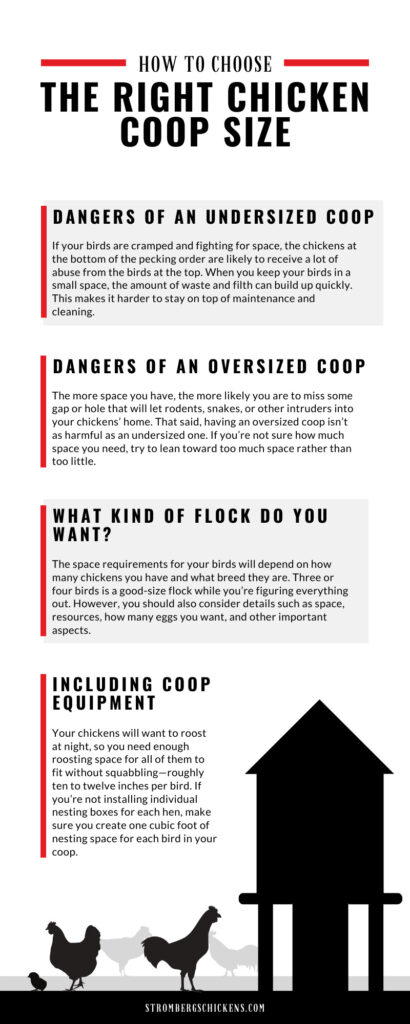How to Choose the Right Chicken Coop Size
When you get any new animal, you have to consider a lot of details. In addition to acquiring the animal itself, you need to make sure you have all the right equipment, supplies, and arrangements in place to ensure they have a happy, healthy life in your home. Chickens are no exception to this rule.
If you decide to try your hand at raising backyard chickens, you need the right tools for the job. One of the most important requirements is a chicken coop, which will provide all the comfort and security your birds will need.
If your chicken coop size is wrong and it doesn’t provide enough space for your birds to sleep, eat, and hang out, you’re going to run into a lot of issues. Avoid the complications and provide the best chicken coop possible for your birds by doing your research ahead of time.
To help you with this step of your chicken-keeping journey, here’s our guide on how to choose the right chicken coop size.
DANGERS OF AN UNDERSIZED COOP
Research is a key part of becoming successful chicken keepers. In addition to knowing chicken coop sizes, you should know why they need it. A lot of issues and complications can stem from an undersized chicken coop.
The most obvious symptom of an undersized chicken coop is aggressive behavior. Like many animals, your chickens might lash out at each other if they have to compete for food, water, or comfortable space. Chicken flocks like to establish a pecking order that determines who is most dominant in a flock.
If your birds are cramped and fighting for space in a chicken coop, the chickens at the bottom of the pecking order are likely to receive a lot of abuse from the birds at the top.
Many health issues can also stem from an inadequate chicken coop size. When you keep your birds in a small space, the amount of waste and filth can build up quickly. This makes it harder to stay on top of maintenance and cleaning.
Dirty bedding can also build up and lead to higher ammonia levels within your spacious coop. A clean, dry chicken coop size is key to preventing many of the most common health issues chickens face.
Finally, the stress of living in cramped quarters can also have negative effects on your birds’ health. With increased aggression, not enough room to comfortably rest, and the lack of a clean environment, your hens might get too stressed to lay eggs properly. Stress can also affect your birds’ immune systems, making them more prone to diseases. Even if a smaller chicken coop saves you money initially, it’ll cost you down the line with veterinary bills and lower egg production when raising chickens.
DANGERS OF AN OVERSIZED COOP
You don’t want your chicken coops to be too small, but you don’t want to make it too big, either. Larger chicken coops mean more coop space to clean. You can save yourself a lot of hassle and effort by cutting down on excess space. More importantly, large coops are harder to insulate during cold weather.
Backyard chickens are hardy creatures, but no one likes a draft in the winter. Similarly, it’s easier to secure a small coop from predators. The more floor space you have, the more likely you are to miss some gap or hole that will let rodents, snakes, or other intruders into your chickens’ home.
That said, having an oversized coop isn’t as harmful as an undersized one. If you’re not sure how much space you need, try to lean toward too much space rather than too little.
WHAT KIND OF FLOCK DO YOU WANT?
When it comes to how to choose the right chicken coop size, you need to consider the flock that will live there. The space requirements for your birds will depend on how many free range chickens you have and what breed they are.
You should also keep your chickens’ outdoor space in mind. Your birds should have plenty of room inside the coop as well as outside in their field or run.
For large chicken breeds, the recommended minimum space is four square feet inside the coop and ten square feet outside for each chicken.
Medium breeds should have at least three square feet inside and eight square feet outside.
Small breeds need at least two square feet inside and five square feet outside. Of course, these numbers are merely guidelines.
Make sure you read up on the specific chickens you’re buying to get the most accurate coop space requirements for your flock.
In addition to breeds, however, you also need to decide how many birds you want in your flock. If this is your first experience keeping chickens, start small. Three or four birds is a good-size flock while you’re figuring everything out.
However, you should also consider details such as space, resources, how many eggs you want, and other important aspects. Remember that you can always grow your flock later. In fact, many people find backyard chicken-keeping addictive.
It’s not uncommon for a new chicken keeper to quickly expand the size of their flock. Try to start with just a few birds so that you can get a handle on the responsibilities and chicken coop size requirements that will come with every new bird you bring home.
INCLUDING COOP EQUIPMENT
Free-range chickens aren’t the only things that will take up space in your coop. Make sure you also account for the equipment that will be inside the coop. Your chickens will want to roost at night, so you need enough roosting space for all of them to fit without squabbling—roughly ten to twelve inches per bird.
Similarly, your chickens all need plenty of room to nest comfortably. If you’re not installing individual nesting boxes for each hen, make sure you create one cubic foot of nesting space for each bird in your coop.
Finally, ensure your flock has some wiggle room. Chickens are naturally curious creatures that like to spend their days strutting around and pecking at every interesting thing they come across. This isn’t all going to happen inside your coop, so it’s important to give your birds the extra space they need to live comfortably.
Now that you know how to choose the right chicken coop size, you’re ready to start making preparations for your flock. Head on over to Stromberg’s to find everything you need to start a successful flock.
We’ve got the essential coop housing supplies, coop heaters, nesting boxes, and any other resources you would need to start your backyard chicken-keeping career on the right foot.

